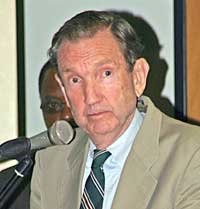Haiti tribunal establishes responsibilities for atrocities
By
G. Dunkel
Montreal
Published May 30, 2006 10:12 PM
The Fourth International
Tribunal on Haiti, like the three before it, aimed at exposing individual
responsibility for the crimes committed in Haiti after the United States, France
and Canada collectively coordinated the coup and kidnapping of President
Jean-Bertrand Aristide on Feb. 29, 2004.
|
Ramsey Clark reports on last year’s
Commission of Inquiry in Haiti.
WW photo: G. Dunkel
|
The tribunal’s political
point about the role of the United Nations as a front, a tool and a cover for
these three big capitalist countries was sharpened by the fact that newly
elected Haitian President René Préval has not been able to release
the hundreds of political prisoners, almost all Aristide supporters, that the
de-facto regime threw in jail. He hasn’t even been able to denounce the
agreement that Gérard Latortue, the president of Haiti imposed by the UN,
made giving the UN’s CIVPOL (Civilian Police) control of Haiti’s
national police (PNH) and prisons for the next two-and-a-half years.
Held
in Montreal May 27 at the Université de Montréal, the tribunal was
a success. Four hundred people, a strong majority of them from the Haitian
community in Quebec, came, even though the Montreal cops had blocked off the
whole neighborhood because an international bicycle race was using the roads.
The tribunal had been widely promoted on French and Creole radio shows. Parts of
the program were in French and Creole, but most was in English. Simultaneous
translation from English to French was available.
Anthony Fenton, a
journalist and researcher, presented Canada’s role in “subverting
and destroying democracy in Haiti and destabilizing its government” both
before and after the coup-knapping of Aristide.
Ramsey Clark, former
attorney general of the United States who led the Tribunal’s Commission of
Inquiry in Haiti last year, put the videotaped testimony into political and
historical context. Clark pointed out that in 1804, when Haiti won its
independence from France—at such a high cost that perhaps half the Haitian
people died in that struggle—the Haitian people only had to confront one
world power. “Now the Haitian people must confront the whole world in the
form of the United Nations, which is subservient to the United
States.”
Clark continued: “Unless there is accountability now,
the same forces that killed Dessalines [the leader who declared Haiti
independent] and removed Aristide twice, unless their individual agents are held
responsible, Haiti will not obtain real independence and it is unclear how long
the government put into power by this last election will last. Never doubt the
importance of this commission and its role in supporting the Haitian
people.”
After Clark spoke some of the videotaped testimony that the
Commission of Inquiry had gathered was presented.
A high point was the
testimony of an old woman who lived in one of the houses that attachés
burned in 2005 under the protection of CIVPOL. Attachés are freelancers
hired by members of the PNH to do their dirty work—killing and mutilating
people—and let the PNH disclaim responsibility. When the attachés
told her to lie down on the floor, she explained, “I knew they were going
to disappear me. So I ran out the door and away.”
Her testimony and
that of others established that the UN Mission to Stabilize Haiti protected the
PNH and its attachés when they attacked areas like Bel Air when people
were resisting. Two UN officers were directly responsible for atrocities; their
cases will be referred to the International Court of Justice.
Brian
Concannon, who was acting as the tribunal’s juge d’instruction, a
magistrate who examines the evidence in a criminal case under Haitian law,
closed the session by examining the responsibility of Bernard Gousse. Gousse was
justice minister when these atrocities were committed, and threw most of the
political prisoners in jail.
While Gousse’s general responsibility
is clear, the only person in the United States who could testify on the details
of his illegal acts, the Rev. Jean Juste, suffers from cancer and was not
available. His deeds will be examined at another tribunal.
The next
International Tribunal is scheduled for Port-au-Prince in September.
Articles copyright 1995-2012 Workers World.
Verbatim copying and distribution of this entire article is permitted in any medium without royalty provided this notice is preserved.
Workers World, 55 W. 17 St., NY, NY 10011
Email:
[email protected]
Subscribe
[email protected]
Support independent news
DONATE


